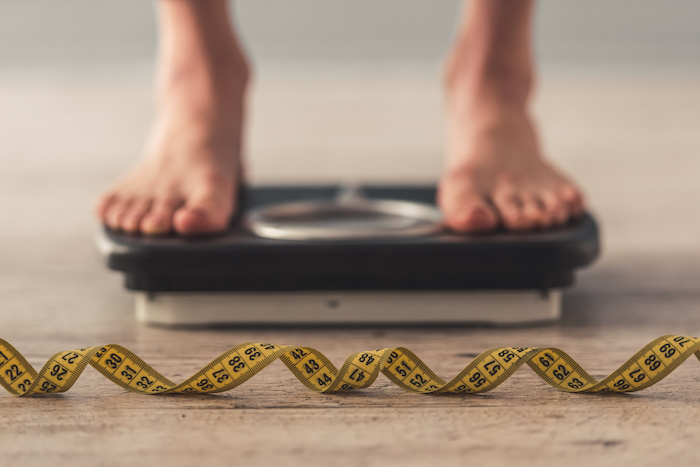
A recent survey revealed that an estimated 83.6 million adults in America received less than 7 hours of sleep in a 24-hour period.
Everyone needs a good night of sleep. Sleep is the one thing in our world that fixes a vast majority of health problems. When we sleep, our body repairs itself and rebuilds what damage we’ve done during the day.
Yet, often the same problems that sleep can fix also causes the problems stealing that sleep.
Sleep apnea is a serious sleep disorder that can lead to a myriad of health problems, including weight gain. Ironically, though, the very same problem, excess weight, can cause sleep apnea.
Keep reading to learn about the relationship between sleep apnea and weight.
Sleep Apnea and Weight
Weight plays an important role in sleep apnea. If you’re carrying extra weight, you may struggle to get a good night’s sleep.
Sleep apnea is a common sleep disorder in which people stop breathing while they are sleeping. The most common type of sleep apnea is Obstructive Sleep Apnea or OSA.
With OSA, a narrow or blocked upper airway causes an individual to stop breathing momentarily. If you are overweight, then it may be common to have a narrow or blocked upper airway.
Imagine breathing through a straw. That’s what OSA feels like.
Individuals with severe OSA can stop breathing as much as 30 times a night. If you’re someone who gets eight hours of sleep, that means you’re averaging almost four episodes an hour of disrupted breathing.
Can Sleep Apnea Cause Weight Gain?
Yes, untreated sleep apnea can cause weight gain.
Sleep deprivation disrupts the normal production of two different hormones. Leptin, an appetite-suppressing hormone, decreases when you do not get an adequate amount of sleep. Conversely, ghrelin, an appetite-stimulating hormone, increases.
Furthermore, less sleep can lead to obesity and overeating. Sleep deprivation also makes fat loss difficult even when you’re restricting calories.
This means that even though you may be trying to lose weight by cutting down your calories, your body will not respond efficiently if you’re not getting enough sleep. Sleep makes up a part of the equation for effective weight loss. When you do not sleep enough, you have more food cravings.
Furthermore, those with untreated OSA tend to gain weight more easily than individuals with the same body mass index and health. What’s the difference? Untreated sleep apnea.
Additionally, when you’re tired, you do not have the energy needed to maintain the active lifestyle that leads to a healthy body weight. Fatigue rules your day as you muttle through after a restless night. When you are lacking sleep, you may continue to exercise less and less because exercise is even harder.
Think You May Have Sleep Apnea? Take Our FREE Sleep Apnea Quiz!
Can Being Overweight Cause Sleep Apnea?
Not only does untreated sleep apnea lead to weight gain but being overweight can cause sleep apnea. The physiological changes in an overweight individual’s body can cause disrupted sleep.
Neck
Obese individuals tend to have fat deposits in their neck. Pharyngeal fat, or neck fat, can block an individuals’ upper airway as they attempt to sleep. The airway is relaxed, and the fat falls into it, causing a narrow airway and often snoring.
As you attempt to sleep, the narrow airway causes airflow restriction and thus a loud noise—snoring.
Chest
A larger abdominal girth from excess fat will compress an individual’s chest wall. This compression leads to decreased lung volume, so an obese person has a smaller lung capacity and thus, less airflow.
Tonsils
Larger tonsils can also cause sleep apnea as they tend to block the airway during sleep. Other disorders like a large neck or narrow throat, acid reflux, heart problems, diabetes and thyroid disorders, and lung diseases can cause problems with the tonsils.
Can Losing Weight Cure Sleep Apnea?
If sleep apnea and weight have such a close relationship, one has to wonder if losing weight can cure sleep apnea.
Losing weight certainly can lead to better sleep if being overweight is the problem to start with. Most OSA sufferers will experience better sleep if they lose weight. The fatty deposits around their neck, the greater abdominal girth, and the tonsil issues will all decrease with weight loss.
Plus, when a person loses weight, they experience more energy overall during the day. They can establish and maintain an active lifestyle without the constant fatigue.
Some sleep apnea sufferers, however, will need more than just a diet to experience complete relief.
Can Thin People Have Sleep Apnea?
Thin people can be diagnosed with sleep apnea. Individuals born with a naturally narrow airway may also have sleep apnea regardless of their weight.
Additionally, those individuals with high blood pressure or chronic nasal congestion also tend to lose sleep as a result of sleep apnea.
Studies are also showing that individuals who smoke are more likely to have OSA as are those individuals with diabetes.
Even sex can be a determiner. Men tend to have sleep apnea more often than women.
Thus, while weight is a major factor with sleep apnea, weight alone does not determine if you’ll have trouble sleeping as a result of untreated sleep apnea. Blood pressure, nasal congestion, a nicotine habit, and gender also plays a part in if you have sleep apnea.
Sleep Apnea Treatment and Weight Loss
One has to wonder if excess weight can cause sleep apnea and sleep apnea can cause excess weight, then can curing sleep apnea lead to weight loss and vice versa? Is there a relationship between weight loss after sleep apnea treatment?
Proper treatment for any sleep disorder will lead to a better life. If you manage your sleep apnea, you will find yourself with more energy during the day. This extra energy means you may find losing weight a little easier.
Even after just two days of CPAP treatment, a study found that ghrelin, the hormone that stimulates appetites, decreased. This means that individuals who treat their sleep apnea experienced a decreased appetite.
Sleep Well, Be Healthy
Since weight gain and sleep deprivation are closely related, once you begin treating your sleep apnea, you may notice some weight loss.
Sleep apnea and weight have a close relationship. Treating both problems will ultimately lead to a much healthier and longer life.





